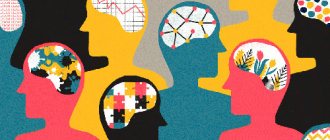Psychological health or mental health? Often people searching for information confuse these concepts, since they are quite close, and it is difficult for a non-specialist to separate them from each other. But there is still a difference: mental health rather indicates the absence of mental illness and good adaptability, while psychological health indicates a high level of personal development.
Differences
What is the difference between mental and psychological health?
The first concept includes the absence of disturbances in the development and functioning of mental processes and the nervous system. These are features of the psyche that allow a person to adapt to society, the external environment, and changing conditions without loss of health, including mental health. Here we can talk about the adequacy of the perception of the surrounding reality, oneself and other people. This also includes the balanced work of mental defenses, which protects the nervous system, but does not block further activity. The opposite of health can be considered the presence of mental disorders, deviations and diseases in a person.
Psychological health includes the health of the soul and personality as a whole. A person can not only adapt to the conditions of the existing world, but is also able to take responsibility, make choices, be independent, and is also capable of self-development and strives to increase the level of his personal development. Psychological health also indicates a good level of development of the motivational, volitional, emotional and cognitive spheres.
These are different concepts, so the question of which is correct - mental or psychological health can be considered incorrect.
What is the difference between neurological and mental illnesses?
Some neurologists believe that a "neurological disorder" is a kind of "commentary" on the "physical" (structural) and functional signs (symptoms) of damage to the "brain" rather than the "mental domain", such as thinking.
Definitions of what constitutes signs (symptoms) of a mental disorder have changed much more frequently in the history of psychiatry than in any other medical discipline. on the subject of semiotics of a particular disease. “Mental illness” is essentially a “cultural judgment,” and individual “labels” such as “schizophrenia” or “bipolar affective disorder” describe a variety of phenomena that are sometimes different from each other or even directly opposed to each other. and sometimes they have a common biological (genetic) base. From time to time it seems that "Mental illness" is not a scientific term, and claims to this paradigm (term criteria) cannot be objectively verified. The definition of “mental illness” takes a completely different approach and evaluates phenomena based on psychosocial criteria. The "mental illness" paradigm completely excludes signs of brain damage as a defining feature of how to classify or label a mental disorder, prohibiting the use of medical criteria, and effectively states that these labels have no "physical" consistency with them. Additionally, the "mental illness" model suggests that there are no medical or psychological differences between "mental illness" and "non-mental illness".
It seems that neuroscience is “necessarily objective” while psychiatry is “necessarily subjective,” even though both disciplines are about how we interpret human experience.
Essentially, “mental illness” is a psychiatrist’s way of telling a patient “we don’t know why this is happening” and “there is no need for an objective diagnosis of a mental disorder.” So, the psychiatrist argues that there is no medical explanation that can be found for a mental disorder, and one must look elsewhere for the definition of “mental disorder”, just not in the area of neurology. "Mental illness" is a diagnosis of exclusion - all other explanations must fail here, and professionals generally refuse and assign a logically convenient "label" in order to avoid confusion about the diagnosis of this or that mental disorder.
Some doctors say that neurology and psychiatry are either “twins” who want but cannot separate, or are actually two manifestations of the same “subject” (brain disease). There is no doubt that psychiatry is limited from neurology in a completely arbitrary line, and there is a large degree of overlap between these specialties.
How do they relate?
How do mental and psychological health relate? On the one hand, psychological health is a broader concept that includes mental health. On the other hand, these are two equivalent components of determining human health in general.
It should be understood that a good level of one of these components does not guarantee the same degree of manifestation of the second. For example, a person may have mild mental illness but compensate for their health through personal development and mental well-being. Also, a person who initially has a healthy personality, high performance and adapts well to the surrounding reality may have deviations in the form of mental disorders.
Features of female psychology
Concentration in women is poorly developed, but representatives of the fairer sex are able to quickly switch attention. She was just talking with a friend about what type of coffee is better, and then she jumps to where it is better to buy a handbag. Women can talk on several topics at the same time and understand each other perfectly. But a woman’s brain is constantly fixated on little things that can get in the way.
Women are able to withstand psychological stress for a long time, but if they do not give it an outlet, a breakdown will occur. Therefore, representatives of the fairer sex need relaxation and a shift of attention to unimportant little things.
Psychological characteristics of centenarians
Jewett studied psychological types as forms of mental health of people who successfully managed to live to a very advanced age (80-90 years). The research results demonstrated that all these people had the following qualities:
- life optimism;
- calm on an emotional level;
- the ability to feel genuine joy;
- feeling of self-sufficiency;
- high adaptability to difficult life situations.
Mental state criteria
Health is the basis of all human life, a certain guarantee of success and that everything will be fine. It is one of the prerequisites for achieving goals in life. In many cultures, it is not only the value of one individual, but also a huge public asset.
The psychological foundations of physical, mental and social health are usually considered in its two aspects. The criteria for assessing mental well-being are most fully disclosed by A. A. Krylov. They also apply to psychological states.
The scientist identifies criteria in accordance with the way they manifest themselves (various processes, properties). Krylov believes that a person who is mentally well can be characterized by the following properties:
- morality (that is, a sense of conscience and honor);
- concentration;
- equilibrium;
- optimistic attitude towards life;
- adequate claims;
- call of Duty;
- lack of touchiness;
- self confidence;
- lack of laziness;
- general naturalness;
- having a sense of humor;
- independence;
- responsibility;
- patience;
- self-control;
- self-respect;
- kindness towards others.
Based on these criteria for psychological health and mental health, which were developed by Krylov, it is possible to conclude that the normal psyche, as a certain component of well-being as a whole, includes a set of characteristics that help establish balance and enable a person to perform his functions in society .
A person with a normal psyche is adapted to life in society, and also takes direct part in it.
Positive thinking
You can find positive aspects in any situation. The ability to find positivity and treat failures as life experiences will help you find new opportunities to improve your life.
How to start thinking positively:
- Avoid bad people. We must learn to interrupt communication with those who cause discomfort.
- Everything that is is for the better. This saying should become exactly the point from which you evaluate all events in your life.
- Smile. Even if there is no reason, it will still improve your mood.
- Find time for small joys, they fill your life with positivity.
- Break the task down into small goals. This will allow you to do a great job gradually and without unnecessary worries.
- Don't be afraid of failure. Failure is simply an indicator that something has been done wrong. We need to take this into account and move on.
- Do not stop. Life is constantly moving. Only by moving forward, through successes and failures, can we achieve something.
Who is a psychiatrist
A psychiatrist is a specialist in the field of psychiatry who works with severe mental pathologies. Unlike an expert in the field of psychology, he has a specialized medical education and conducts drug therapy. The problems of his patients are so serious that he cannot limit himself to providing consultations.
Features of work
If a psychologist or psychotherapist uses more psychological techniques in their work, then the main tool of a psychiatrist, which distinguishes him from these professions, is medications. The difference is that, theoretically, it can influence the patient’s soul with compassion or warmth, but its main treatment is based on the prescription of psychotropic drugs, often powerful and prescribed.
You can understand how a psychiatrist differs from a psychotherapist and psychologist by looking at the list of diseases that he treats:
- bipolar disorder;
- affective insanity;
- hallucinations, delusions;
- epilepsy;
- schizophrenia;
- psychopathy;
- Alzheimer's and Parkinson's diseases;
- memory or consciousness disorder;
- functional psychosis.
To fully understand the difference, it should be noted that the work of a psychiatrist is regulated by the law on psychiatry. In some cases, a specialist has the right to compulsorily hospitalize a person - when the disease threatens the life (health) of the patient himself or those around him.
Portrait of the desired result
Thus, if you draw up a highly generalized portrait of the inner world of a healthy person based on the characteristics highlighted above, then you can see a person who is creative, spontaneous, enjoying his life, cheerful, open to something new, who never stops learning about himself and his surrounding world, not only using reason, but also using your intuition and sensuality.
Such a person fully accepts his own personality, while realizing the value and absolute uniqueness of the people that surround him. He is also in constant self-improvement and helps other people with this.
Such a person first of all takes responsibility for his own life and learns useful lessons from unsuccessful situations. His life, of course, is filled with meaning, which he himself found.
They usually say about such people that “he is in harmony” both with himself and with the world that surrounds him. From this we can identify a key word to describe the term “mental health”. That word would be “harmony.”






